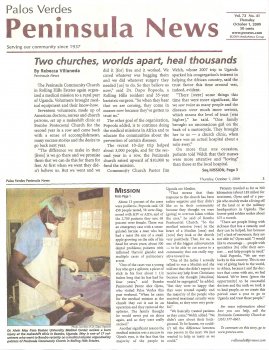By Rebecca Villaneda - Peninsula News
The Peninsula Community Church in Rolling Hills Estates again organized a medical mission to a rural part of Uganda. Volunteers brought medical equipment and their know-how.
Seventeen volunteers, made up of American doctors, nurses and church patrons, set up a makeshift clinic at Bombo Pentecostal Church for the second year in a row and came back with a sense of accomplishment, many success stories and the desire to go back next year.
“The difference we make in their [lives] is we go there and we promise them that we can do this for them for free. At first when we went they didn’t believe us. But we went and we did it [for] free and it worked. We cured whatever was bugging them and we did whatever surgery they needed [us] to do. So they believe us now,” said Dr. Dapo Popoola, a Rolling Hills resident and 35-year bariatric surgeon. “So when they hear that we are coming, they come in masses now because they’ve gotten to trust us.”
The other goal of the organization, Popoola added, is to continue doing the medical missions in Africa and to educate the communities about the prevention of certain diseases.
The recent 10-day trip helped about 3,000 people, and for the second year in a row, the Peninsula church raised upward of $10,000 to fund the mission.
Community Church Pastor Jim Welch, whose 2007 trip to Uganda sparked his congregation’s interest in helping the African country, said the trust factor this time around was, indeed, evident.
“There [were] some things this time that were more significant, like we saw twice as many people and the diseases were much more serious, which means the level of trust [was higher],” he said. “One family brought an unconscious girl on the back of a motorcycle. They brought her to us — a church clinic, when there was an actual hospital about a mile away.”
On more than one occasion, patients told Welch that their nurses were more attentive and “loving” than those at the local hospital.
About 13 percent of the cases were pediatric, Popoola said. Of 458 people tested, 58 were diagnosed with HIV or AIDs, and of the 2,700 patients they saw, 68 percent were female. There was an emergency case with a strangulated hernia; a man who has had a mass the size of a small apple growing on the side of his head for seven years; about 300 dental problems; patients with inflamed thyroid glands; and multiple cases of pulmonary arrest.
“One of the cases was a young boy who got a splinter, a piece of stick in his foot about 1 1/2 inches long that he has had for four years,” said Bombo Pentecostal Pastor Alex Ojera, who visited Palos Verdes this past weekend. “When he came for the medical mission at the church they cut it out in an operation and they removed the splinter. The family thought he would never put on shoes again, and so they were really excited.”
Another significant reason the medical mission was a success in Ojera’s eyes, is the fact that the majority of the people in Uganda are Muslim. “That means that their response to the church has been rather negative and they didn’t like us in their community because they thought we were [going] to overrun Islam within the area,” he said of Bombo Pentecostal Church. “So the medical mission [was] in the heart of a Muslim [area] and [now] they look at the church very positively. That, for us, is one of the biggest achievements — to be able to cut across to a community that was really negative toward us.
“One of the ladies I actually talked to was a Muslim and she told me that she didn’t expect to receive any help from Christians because she thought [Muslims] would be segregated,” he added. “But they were so happy that they were treated equally and the majority of the people who received treatment actually were Muslim, so they were very grateful.”
“We basically treated patients as they came,” Welch added. “We didn’t care about their background. To be honest, we couldn’t tell the difference between one person to the next. We just wanted to help as many as we could.”
Patients traveled as far as 300 kilometers (about 185 miles) for treatment, Ojera said of a people who mainly make a living off of the land or at the military headquarters in Uganda. The lowest-paid soldier makes about $75 a month.
“There are people living with sickness that has a remedy, and they can be helped, but because [of] a lack of resources, they are not able to,” Ojera said. “I would like to encourage … people with specialties [to] offer their services … and help people in need.”
Said Popoola, “We are very lucky in this country. This is one way of giving back to the world, to Africa, because I and the doctors that come with me, we feel blessed. We’ve been [given the opportunity] to be successful doctors and the oath we took is to heal people, so we create this period once a year to go to Uganda and treat these people.”
For more information about how you can help, call the Peninsula Community Church at (310) 377-4661.
This email address is being protected from spambots. You need JavaScript enabled to view it.

